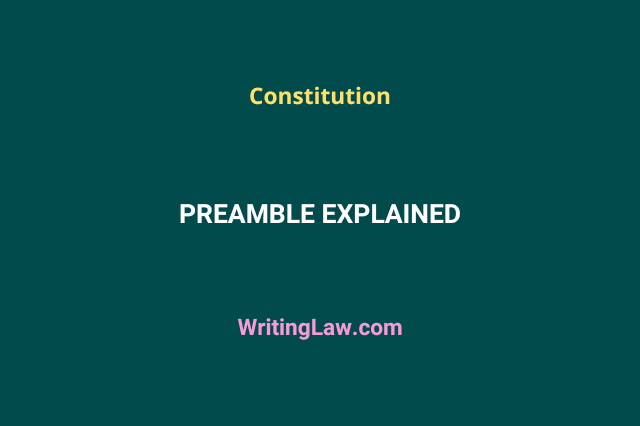
The Preamble of the Constitution sets out the main objectives the legislation aims or aims to accomplish, such as the structure of government, ideals, etc. It further serves as the introduction to the statute. Moreover, it establishes the freedom and rights of every citizen of India. The Preamble facilitates comprehending, understanding and interpreting the purpose, legislative intent and principles of law.
The makers of the Indian Constitution have given it the ‘place of pride.’
This law article provides details about the Preamble of the Indian Constitution.
Purpose of the Preamble
The Preamble of the Constitution of India serves the following purposes:
- The Preamble makes it clear that the country’s citizens themselves gave the Constitution its legitimacy. It exhibits the nation’s democratic, independent, and secular nature.
- The Indian Preamble supports the goals outlined within the parameters of the Constitution. It outlines specific objectives and goals for all classes of people pursuing equality.
- The Preamble states that the right to religion and beliefs allow for a more secular society in the country and that everyone must be free to practise their religion.
- The Preamble recognises the democratic nature of the country.
- It contains the enacting clause, which brings into force the Indian Constitution.
Objectives of the Preamble
These are the objectives of the Preamble of the Indian Constitution that it gives to every citizen:
- It indicates the basic type of government and polity which was to be established.
- It declares the great rights and freedom that the people of India intended to ensure to all the citizens.
Types of Government and Polity Which Was to Be Established
The Preamble of the Indian Constitution acknowledges India as a “sovereign, socialist, secular, democratic republic”. Here is what these terms mean:
Sovereign: Sovereign power is that which is absolute and unrestrained. The word ‘sovereign’ emphasizes that it is no more dependent on any outside authority and no external powers can affect the country.
Socialist: This word was added by the 42nd Amendment in 1976. However, there is no clear definition for the word socialist in the context of the Indian Constitution. Generally, the term denotes a form of government in which the state has full or partial control over the means of production.
Secular: Same as the word ‘socialist’, the word ‘secular’ was also added by the 42nd Amendment in 1976. A secular state is one that does not acknowledge any religion as its official religion. All citizens in India are entitled to equal treatment.
Democratic: The Preamble declares India to be a democratic state. The term democratic means that the Indian Constitution has established a form of government that gets its authority from the will of the people. The leaders are elected by the people, who then are answerable to them.
Republic: This means India is not ruled by a monarch or a nominated head of State. Positively, it indicates that India has an elected head of state who holds office and enjoys power for a specific period of time.
Rights of the People
The Preamble lays down the rights to which the people of India are entitled. These are given in the form of objectives in the Preamble:
- Justice: Social, economic and political
- Liberty: of thought, expression, belief, faith and worship
- Equality: of status and of opportunity
- Fraternity: Assuring the dignity of the individual and the unity and integrity of the nation.
Justice: Social, Economic and Political
India works to ensure its citizens’ social, political, and economic justice.
The lack of socially privileged classes in society is referred to as social justice. Additionally, it ensures that no citizen shall be subjected to discrimination based on caste, creed, race, religion, sex, or place of birth.
Economic justice means the absence of discrimination between people on the basis of income, wealth and economic (financial) status.
Political justice refers to giving all participants equal, free, and fair opportunities in the political process.
Liberty: of Thought, Expression, Belief, Faith and Worship
Ensuring liberty for the citizens of India is another main objective of the Indian Constitution. The Fundamental Rights contained in Part III, including the right to freedom, are designed to secure this objective. The freedom of religion and worship is intended to support the secularist spirit.
Equality: of Status and of Opportunity
The Preamble aims at providing equality in two basic senses:
- Equality of status: Equality of all persons as equal and free citizens of India, enjoying equality before the law.
- Equality of opportunity: This emphasises providing adequate opportunity for all to develop.
Fraternity
The Preamble ensures that a strong sense of spiritual and psychological unity among the people must be inculcated (taught or developed). Fraternity intends to safeguard each person’s dignity as well as the unity and integrity of the country.
Can the Preamble of the Indian Constitution Be Amended?
The famous case of Kesavananda Bharati vs the State of Kerala dealt with the issue related to the amendment of the Preamble for the first time. According to the Attorney General, in this case, the amendment power under Article 368 of the Indian Constitution allows for the amendment of even the Preamble. It was asserted that since the Preamble is a part of the Constitution, it could be amended just like any other provision in the Constitution. The Preamble, however, places an implied restriction on the power of amendment.
In other words, the court held that since the Preamble is part of the Constitution, it can be amended but subject to the condition that the “basic features” in the Preamble cannot be amended.
The Preamble cannot be amended in a way that makes the country no longer a “sovereign democratic republic.” It can only be done by wrecking (destroying) the Constitution.
- Understanding the Legislative Branch of the Indian Government - 6th May 2024
- Appointment, Oath, and Removal of Constitutional Posts in India - 28th April 2024
- Powers of Income Tax Authorities in India - 26th April 2024







